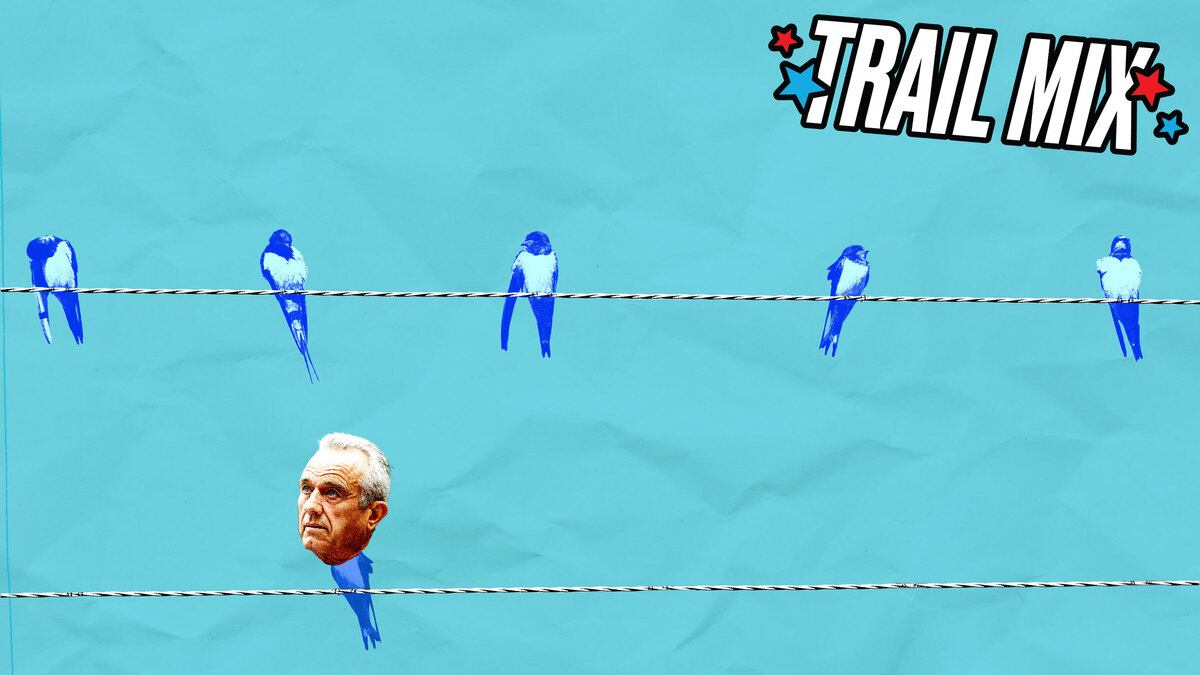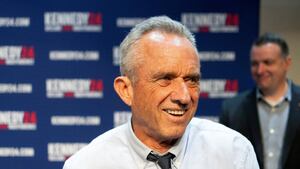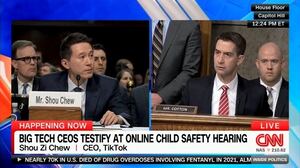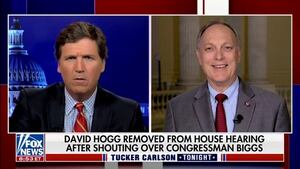Welcome to Trail Mix, your 2024 election sanity guide. See something interesting on the trail? Email me at jake.lahut@thedailybeast.com.
This week, we go inside the covert efforts to derail Robert F. Kennedy, Jr., before it’s too late for the Democrats. Plus, more exclusive details on the Biden campaign’s decision to join TikTok, and an interview with David Hogg.
GLOVES OFF
On the surface, it might look like President Joe Biden and the national Democratic Party are entirely focused on attacking Donald Trump as the 2024 election ramps up.
But increasingly, Democratic organizations and operatives are sharpening their knives for a rival they've long ignored—at least publicly—who could pose a serious threat to Biden’s re-election.
Democrat-turned-independent candidate Robert F. Kennedy Jr., Democrats fear, could potentially throw the election to Trump by cobbling together an unconventional spoiler coalition in the November election.
While Kennedy could easily siphon many votes from Trump, thanks to his anti-vaccine advocacy and appeal to the conspiratorial right wing, the man with the most famous name in Democratic politics could potentially win over plenty of left-leaning independents who have soured on Biden.
With key battleground states set to be decided by harrowingly thin margins again in 2024, top Democrats are preparing as if Kennedy will be a serious spoiler threat to the president.
American Bridge 21st Century, a Democratic-aligned super PAC and an opposition research hub for the party, hasn’t ruled out going on the TV airwaves with negative ads against Kennedy.
A Democratic operative with the organization described Kennedy as “a high-value, top target for us over at American Bridge.”
Although Kennedy is officially on the general election ballot only in deep red Utah so far, Democrats have already gotten to work putting a dent in his numbers in purple states where he could compete.
In Michigan and Wisconsin in particular, Democratic sources involved in the planning to thwart Kennedy said he appears best positioned to have a chance at earning enough support to account for the margin between Biden and Trump in those states.
In interviews, multiple Democrats referred to Kennedy as “a stalking horse” for Trump and indicated their effort to sink Kennedy depends on their success in tying him to the former president and his supporters.
A key part of the strategy has been to publicly highlight megadonors like Timothy Mellon, who has already donated more than $15 million to a pro-Kennedy super PAC and has given tens of millions of dollars to Trump over the years.
The Democratic National Committee has paid for four billboards in Grand Rapids, Michigan, to highlight Mellon’s donations to the Kennedy PAC during the candidate’s swing through the state last week. The ad spots described Kennedy as “powered by MAGA/Trump.”

A DNC-sponsored billboard in Grand Rapids, Michigan, highlighting Mellon's support for Kennedy and Trump as Kennedy campaigned in the state.
Emily Elconin/Getty Images for DNCThe party also filed an FEC complaint against the Kennedy campaign last Friday, accusing them of illegally coordinating with the PAC to get him on the ballot.
Democrats familiar with the DNC’s planning said to expect more attacks on Kennedy’s association with Trump in the coming months to build on the billboard campaign and FEC complaint, but there are no new ads or other major broadsides imminently awaiting him.
Making Kennedy’s connections with Trump, rather than his history of anti-vaccine views, is a more effective way to pull back supporters who have soured on Biden, the Democrats involved said.
“It’s clear that Donald Trump and his supporters view RFK Jr. as a useful stalking horse who could throw the election to Donald Trump,” Lis Smith, the veteran operative who recently joined the DNC on a short-term basis to address the threat of third party and independent candidates.
“Given the small number of votes that determine a few key swing states, it’s important that voters are aware of this troubling scheme,” Smith said.
There are multiple independent and third-party presidential campaigns emerging for 2024—including two from the left, Jill Stein and Cornel West—but Kennedy is the most unusual of them from the Biden perspective. He has enough big money and small-dollar donors behind him to sustain a campaign through the fall. The public polling on his strength in a general election is scattershot, ranging from the single digits to the teens and even low twenties.
National Democrats were loath to give Kennedy any oxygen when he was running directly against Biden in the Democratic primary, even more so when he relaunched as an independent candidate for the general election.
But with Biden facing troubling poll numbers in many battleground states, and with Trump swiftly locking up the GOP nomination, that posture is changing.
“We’ll explore just about every tactic that’s feasible and is gonna make sense… We just want to make sure this person doesn’t get a free pass to campaign for several months,” the Democratic operative with American Bridge told The Daily Beast. “Primarily for us it’s making sure that someone is tracking this operation and trying to get that information out into the world.”
Mallory McMorrow, a Michigan state senator and Biden supporter, said the toughest thing for Democrats to contend with is the prospect of a 2020 rematch and how much that can fuel a candidate like Kennedy.
“The general vibe I’m picking up from voters when I’m talking to them is that this feels like Groundhog Day with Trump vs. Biden again,” McMorrow told The Daily Beast. “There’s just a general sense of exhaustion, and naturally when that happens, people are holding out hope that there’s some other option, and hearing about a Kennedy is exciting.”
McMorrow said “the idea” of a Kennedy may be initially appealing to voters, but not once they learn more about him. “This is a low-rent knockoff Kennedy,” she said.
A Kennedy-aligned campaign operative pointed to Sunday’s Super Bowl commercial, paid for by the candidate’s super PAC, as a turning point, even though the candidate later apologized over the ad using the campaign jingle from his uncle, John F. Kennedy.
“A $7 million Super Bowl ad was not something they could ignore,” the Kennedy supporter said, requesting anonymity to discuss how the campaign has responded. They warned negative ad spending could backfire on Democrats, especially given Kennedy’s appeal as “someone who grew up deep on the inside of one of America’s most powerful political families, and now he finds himself on the outside.”
A Monmouth University poll of Kennedy supporters from December found only one in four voters expressing enthusiasm about a Biden-Trump rematch, and around one in five voters saying they may vote for Kennedy on Election Day.

Robert F. Kennedy Jr. poses with supporters during a meet and greet after a voter rally on February 10 in Grand Rapids, Michigan.
Emily Elconin/Getty ImagesIf Kennedy is actually going to siphon off 20 percent of the vote—an unlikely scenario but still a possibility—his candidacy could have massive implications. Even 1 percent in the right states may swing the entire election. (Biden won Georgia by about 12,000 votes, Arizona by less than 11,000 votes, Wisconsin by 20,000 votes, and Pennsylvania by 81,000 votes. Any combination of these states could sway the election.)
Which is why Democrats are taking Kennedy’s prospects so seriously—and why they’re trying to ensure that any attacks they levy against Kennedy bring Democratic voters back to Biden and leave Trump-curious voters supporting RFK Jr.
Tim Hogan, a Democratic consultant and former communications director for Minnesota Sen. Amy Klobuchar’s 2020 presidential campaign, said the line of attack tying Kennedy to Trump should bring “soft Democrats” back into the fold for the Biden campaign.
But he added that others need to be convinced he’s not an anti-establishment movement leader.
“Sometimes people can wrap themselves in an anti-establishment clothing, but sometimes being anti-establishment just means you’re a loser or you’re hiding their views,” Hogan said. “And I think voters can tell the difference between a phony and a movement leader. He’s no movement leader.”
RFK Jr.’s press secretary, Stefanie Spear, clearly disagreed.
“Donors from across the political spectrum are supporting the Kennedy campaign as they are tired of the corruption in the two-party system,” Spear said. “Instead, donors want an independent candidate who will heal the divide, restore the middle class, end the forever wars, unravel corporate capture, and the end chronic disease epidemic.”
For now, groups like the DNC and American Bridge are waiting for Kennedy’s next move—like getting on the ballot in other states.
“If he got on the ballot somewhere other than Utah,” the Democrat with American Bridge said, “some conversations would be had about what that next step would look like, whether it’s a paid operation or something else.”
NOW TRENDING
After months of internal discussions, the Biden campaign decided to launch an account—on Super Bowl Sunday—on the popular video-sharing platform, TikTok.
The effort began modestly: The president’s first appearance on the platform was a simple video featuring him answering questions about the Super Bowl and complimenting the mother of Chiefs star—and more importantly, Taylor Swift’s boyfriend—Travis Kelce for making “great chocolate chip cookies.”
Despite the less than serious topic, the Biden team’s decision to engage in Gen Z’s increasingly preferred source of information is a major development. American politicians have largely shunned TikTok—whose parent company, Bytedance, is partially owned by China—because its data practices and ties to Beijing have raised national security concerns as well as anxiety over optics.
For Biden’s team, security was the main concern, according to a source familiar with the TikTok decision. Biden’s own administration deemed TikTok enough of a security risk that it banned the app from all government devices in 2022.
The campaign team has tried to assuage those concerns by posting from the Biden-Harris HQ account, from a device that is solely dedicated for the purpose of hosting TikTok, though Republican China hawks and Biden critics have still lambasted the move.
Although the Biden campaign has no plans to produce video content exclusively for TikTok—treating it the same way they use Instagram Reels and YouTube Shorts—the source familiar with the planning said it will still play a role in countering concerns that Biden is too old for another term in office.
The campaign also isn’t ruling out either Biden or Vice President Kamala Harris eventually getting their own accounts on the app.
For now, the campaign will operate like many other TikTok users, trying out a few hashtags and a catchy song in the hopes it finds enough people within the app’s various niches.
A low-budget approach to try and see what sticks is the right place for the Biden campaign to start, said Keith Edwards, a Democratic communications specialist.
“That’s kind of how you do these things, you just constantly have to be throwing spaghetti at the wall,” Edwards told The Daily Beast. “I would view it as a kind of message testing.”
DeNora Getachew, the CEO of DoSomething.org—an international nonprofit aimed at helping young people become active citizens—told The Daily Beast she thinks the early videos have been promising, but she’d like to see the Biden campaign use its TikTok account to focus more on “what motivates Gen Z.”
She mentioned “student debt and college affordability, reproductive access, and affordable health care” along with mental health as subject areas where the campaign could connect the most.
So far, the Biden-Harris HQ account has seen diminishing returns after their debut video put up an impressive 5 million views in just one day, which climbed to 9 million soon after.
Since then, 13 other videos posted to the platform have fallen in the five-figure to low six-figure range of viewership.
Some of the videos are simple TV clips of prominent Biden supporters, such as Rep. Alexandria Ocasio-Cortez (D-NY), while others have a more distinct Millennial to Gen Z feel. On Wednesday, the campaign used a TikTok-specific template created around “My Love Mine All Mine,” an angsty song by Mitski, an artist beloved by twenty- and thirtysomethings, to troll Trump with a Valentine’s Day greeting.
“I love you almost as much as Trump loves banning abortion,” the campaign wrote in the first slide of the post. “I love you almost as much as Trump loves telling Russia to invade Europe.”
Another video featured a back and forth between Michael Tyler, the campaign’s communications director, and Rob Flaherty, deputy campaign manager. Tyler lamented a “lazy media narrative” around Biden’s age, while Flaherty delivered a dramatic reading of some New York Times coverage around Special Counsel Robert Hur’s report, which concluded that Biden had persistent memory problems during his two-part deposition.
Although that video was replete with the type of jump cuts and close-up shots common among young content creators, don’t expect the Biden campaign to push the envelope much further when it comes to jumping on digital trends. Instagram Reels, not TikTok, is where the campaign is more likely to experiment with any dance or lip syncing trends, according to the source familiar with the planning.
The Biden campaign estimates one in three Americans consumes no political media whatsoever. That demographic of general scrollers, rather than specific demographics, is who the president’s re-election team is hoping to reach through their foray into TikTok.
Edwards said the ultimate goal should be getting a TikTok video to make big enough waves that the message makes the leap from online discourse into real life.
“It takes on a life of its own,” Edwards said, “and that’s what you’re always hoping for: that you’re gonna post something that spreads outside of the app. Twitter was the best at that back in its prime. TikTok is kind of taking the reins from that. Part of their job right now is building the machine so that moment can happen more and more often.”
Q&A: DAVID HOGG
After years on the front lines of the gun control movement, David Hogg—the 23-year old activist and survivor of the Parkland, Florida, school shooting—is turning to a new project: recruiting more Gen Z candidates for political office.
Hogg’s new PAC, Leaders We Deserve, raised over $3 million between October and December 2023; he hopes to roll out an endorsement slate featuring some 30 state level candidates along with one to three “potential future rockstars” in Congress.
In a phone interview with The Daily Beast, Hogg talked about getting his generation into elected office and explained how Biden can win over young voters who are concerned about his age, his policies, or both.
The following interview has been lightly edited for length and clarity.
Trail Mix: What are the biggest obstacles in recruiting Gen Z candidates?
David Hogg: There’s a lot of challenges, especially when it comes to running for state legislature, which is where we do the vast majority of our work. The first one is that it doesn’t pay well. I think people need to understand, there’s a young person we talked to in Texas at one point and she is a [first-generation American], didn’t come from a background where she’s super wealthy, and just didn’t know how to run for office when you’re expected to take six months off every two years for just $7,000. I don’t know about you, but most people I know can’t take six months off their job every two years. In that case, we put her in touch with a younger woman of color on our advisory board and was able to gain a better understanding and talk more with her employer about how to work this out.
Many young people have grown up with social media since they were 10, 11 years old, or even younger, and have posted much of their lives online. And that definitely is more of a challenge for these candidates, because of course you can go through and try to make sure that any accounts that you have that are your personal stuff—like a finsta, for example—are private, but you never really know who’s still on there, who’s seen it, and stuff like that.
TM: How well do you think the Biden campaign and White House have managed the concerns over his age?
DH: I’m not a communications expert by any means, but I will say this: I think humor is their ally here. I think back actually to when Ronald Reagan was running for the second time, and there were concerns about his age. One of the things that they did was they joked about it. And the thing is, if you can joke about something, you can prove you’re cognitively there and also address the question without making a huge deal of it.
TM: What’s your read on how much of the dissatisfaction with Biden among voters 18 to 29 is about his age compared to his policies?
DH: It depends. Young people are obviously not a monolith, and there’s differences between all of us, but I think across the board for all ages, if I had to pick one issue that really was hurting a lot of the enthusiasm, I think a lot of it is the age aspect. And it’s not just Biden, let me be clear about that. Americans are tired, in many ways. They don’t want to relive 2020, politically speaking. There’s no way around it, these are both older guys running for president.
But, I think it’s important to acknowledge Biden ran on, really, two things. One was defeating Trump, which he did. The other was on defeating COVID. We've reopened schools, the COVID rates are down, the vaccine rates have gone up, and he’s done that. So I think it's important to acknowledge that and realize too that politicians are not going to be rewarded for averting a disaster like COVID.
At Leaders We Deserve, we’re trying to show young people that the Democratic Party is an intergenerational coalition that not only takes our voices seriously when they pass the first federal gun law in 30 years, when they passed the largest climate law in American history, when they canceled billions of dollars in student debt—I do want to put an asterisk on that though, because a lot of that student debt relief has gone to people over the age of 30. So when you do that, that’s not going to show up in polling of 18 to 29 year olds, sadly. There’s a certain kind of tone deafness that comes with that which can be really counter-productive.

David Hogg is interviewed at the Boston Globe Summit in September 2023.
Pat Greenhouse/The Boston Globe via Getty ImagesTM: What do you think is the biggest difference between Millennials and Gen Z in how they view politics, and what might surprise us from this new generation of candidates?
DH: I think there’s definitely going to be more of a use of social media to talk about what’s going on on a daily basis and staying in touch with their constituents and voters, kind of like AOC has done with Instagram stories to some extent. And I think just generally more urgency. A lot of these candidates are coming from activist backgrounds. A lot of them have had involvement with March for Our Lives in the past or been involved with various social movements that Gen Z has really grown up with at this point.
And I think with Gen Z, we understand uniquely in a way that no other generation really does at this point—except Gen Alpha—anxiety of what it’s like going through a school shooter drill. I think it will bring a certain amount of urgency when we’re in office to demand change on it, and if that means rallying voters as much as we can to get better majorities, of course we're going to do that.
But also, there’s pretty widespread support for working on a bipartisan basis. People want politicians to get things done. Even if it’s small, let’s do it.
POLLING STATION
Among parents with children under 18 years old, Trump has a slight edge over Biden, according to polling exclusively shared with The Daily Beast by the left-leaning firm Data For Progress.
Although the Democratic Party holds a 2 point advantage over the GOP on the question of which party better represents the interests of families with children, Trump led Biden by 3 points when the parents surveyed were asked the same question about the candidates themselves.
Some 42 percent of parents said they think Trump is the best candidate for families with children, while 39 percent said the same for Biden. Fifteen percent said neither candidate, and 4 percent said they don’t know.
Although the share of the U.S. population consisting of parents with children under 18 has been declining over the past two decades, the cohort still makes up around 40 percent of eligible voters, according to Census data. They also make up nearly a third of independent voters, according to Pew Research data.
Another notable finding among the parents surveyed: only 16 percent said future generations will have a better quality of life than their own, while a majority of 58 percent said future generations will be worse off.
Despite Biden trailing Trump among parents in the poll, there was some good news for the incumbent president’s campaign.
Voters were more likely to blame corporations, food manufacturers, and grocery stores for high prices instead of Biden’s own policies—though 58 percent said they continue to remain very concerned about inflation.
CAMPAIGN LIT
GoFundMe once, shame on you. MAGA influencer and Georgia state House hopeful C.J. Pearson sat on much of the money he raised in 2020 to help Black-owned businesses, Sam Brodey scooped.
ZYNsanity. Republicans continue to be up in arms over Sen. Chuck Schumer’s call to regulate the popular nicotine pouch brand, Riley Rogerson reports.
Octogenarian showdown. The Biden campaign plans on countering Trump’s age attacks by reframing the issue around “fitness,” Jake Lahut reports.
Trump National Committee. The Trump takeover of the RNC could be bad news for state-level GOP organizations, Roger Sollenberger reports.











